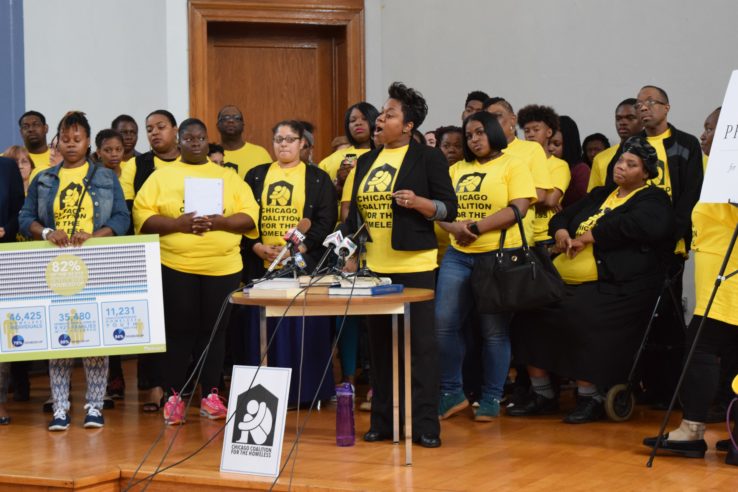
LaTanya Gray, Senior Director of Early Childhood for the Primo Center for Women and Children, at the April 20 press conference announcing FIT: “Most of our families have spent years without secure housing, sleeping on couches or floors, never sure if they’re going to have a place to stay the next night.”
The City of Chicago and the Chicago Coalition for the Homeless launched a new initiative, Housing Support for CPS Families in Transition (FIT), to provide permanent housing and services for 100 families experiencing homelessness in high crime communities. The goal of FIT is to help Chicago’s most vulnerable families to establish stability so that their children can succeed in school and life. The initiative will be funded with a $1 million investment by the Chicago Low Income Housing Trust Fund (CLIHTF) matched with funds via the City’s 4% surcharge on AirBnB and other home sharing programs.
Families that are homeless are at a significantly higher risk for experiencing violence, a dynamic that is magnified in communities where there is a high level of violence. Responding to the lack of housing options and support for the more than 9,925 families with school age children experiencing homelessness in Chicago, the Coalition initiated the HomeWorks Campaign. Working with parent leaders and housing providers, HomeWorks advocates for improved school services and more family-sized housing with supportive services, including housing for families through the Chicago Low-Income Housing Trust Fund and the Chicago Housing Authority. The HomeWorks campaign made very clear that despite the overwhelming need for housing by these families, less than 1% were accessing permanent supportive housing.
Drawing from the methodology and lessons from the Ending Veterans Homeless Initiative and the Chronic Homeless Pilot programs, the City and the HomeWorks campaign partnered to lead the FIT initiative. FIT identifies families with children experiencing homelessness enrolled in the six targeted public schools and provides an assessment for the families using a standard Vulnerability Index. Resources will be targeted to those who are considered to be the most vulnerable. The FIT definition of homelessness includes families that are doubled up and therefore are not eligible for many HUD funded homeless programs.
“We are so excited to see dedicated state and local housing resources going towards permanent housing for homeless families, “ said Julie Dworkin, Director of Policy for the Chicago Coalition for the Homeless. “In particular, we applaud the city for including “doubled-up” families in those considered eligible for the program as this group has had great difficulty accessing housing assistance due to limited definitions of homelessness.”
This summer, the Coalition, the Corporation for Supportive Housing (CSH), and Chicago’s the Department of Family and Support Services began the first phase of this effort by reaching out to families enrolled in the Students in Temporary Living Situations program in six targeted schools to inform them about the program. The second phase will include assessment of all the families and placement of the eligible families into 100 new permanent supportive housing units to be added by the Chicago Low Income Housing Trust Fund. Families identified for the program will receive housing vouchers, support from a housing provider to locate housing, and wraparound services to support them in maintaining their housing.
The Chicago City Council enacted the 4% surcharge on AirBnB and other home sharing programs in 2016 by a vote of 43-7. Proceeds for the surcharge are dedicated to funding supportive services and housing for homeless families as well as people who have been chronically homeless. In addition to the surcharge, the ordinance requires registration, licensing, and data sharing for short-term rentals. The surcharge will generate an estimated $2 million annually.
To learn more about FIT, contact Chicago Coalition for the Homeless Associate Policy Director Mary Tarullo at mary@chicagohomeless.org or (312) 641-4140.
